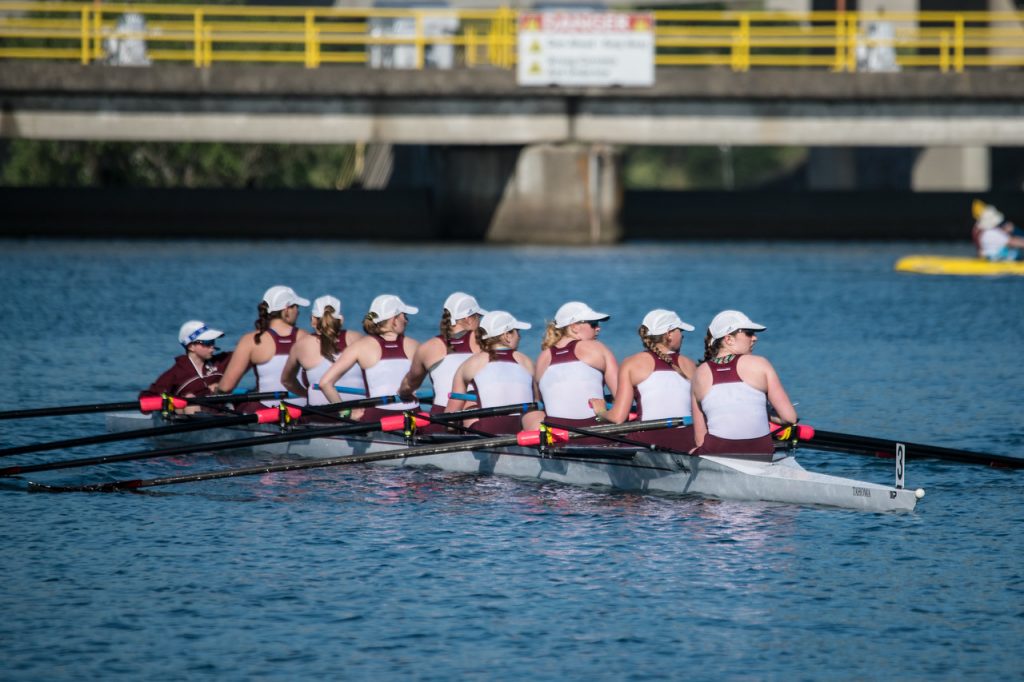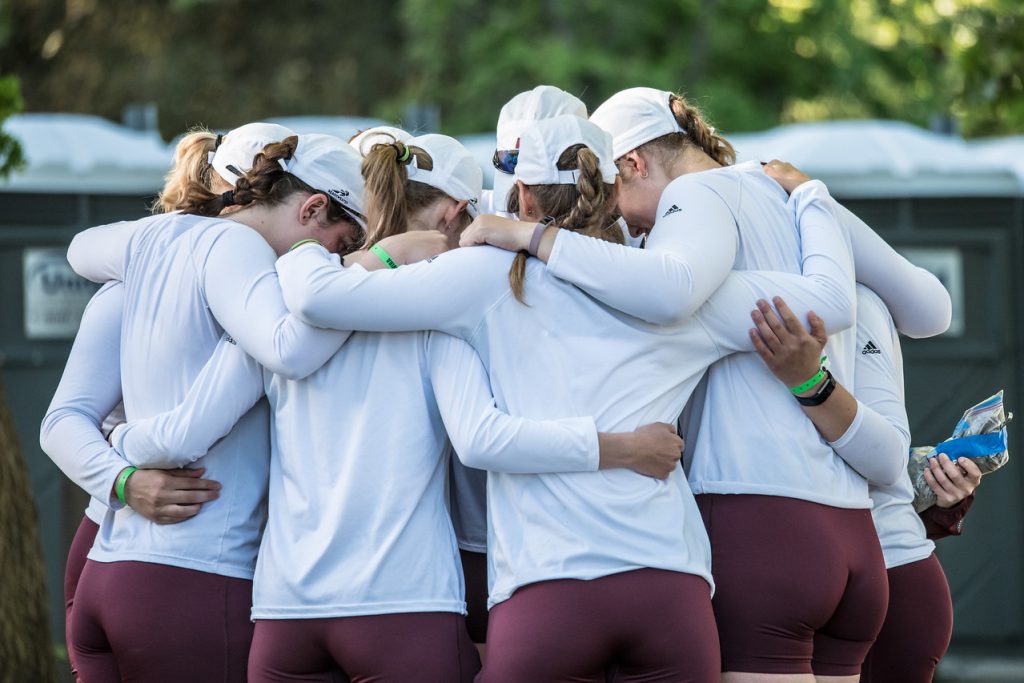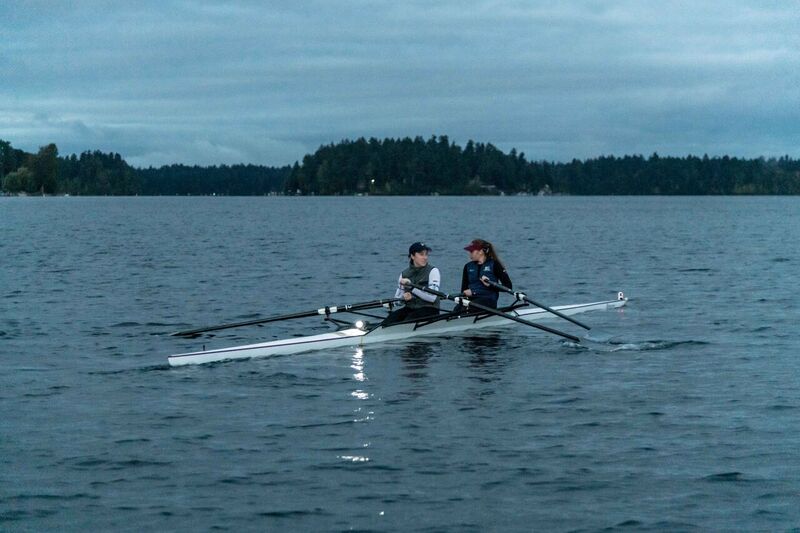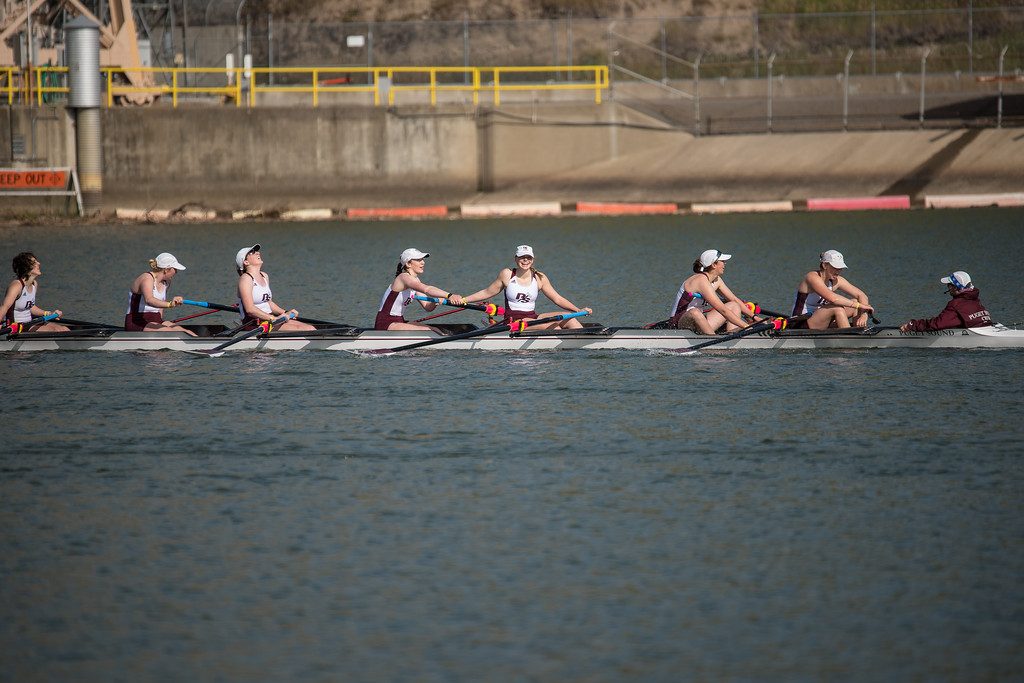By Monica Schweitz, class of 2020
This article is dedicated to all senior athletes whose last season was cut short by the covid-19 pandemic.
“Regard the mountain.”
These are the words that my coach, Aaron Benson, would say whenever we rowed past Mt. Rainer during a particularly glorious sunrise on American Lake. Whether we were warming up, cooling down, or merely on a thirty-second pause between sprints, he never failed to remind us to stop, to breathe, to appreciate the beauty of the moment we have been given, and to be grateful.
It would be impossible for me to sum up in one little article all the ways that crew has fundamentally changed my life. So, I won’t attempt that. Instead, I want to take this space to acknowledge and be grateful for my experience. The purpose of this article, then, is to pause and simply recognize, appreciate, and celebrate Logger Women’s Crew. In other words, to regard the mountain.

Crew isn’t one of those sports that gets a lot of attention around campus, and though that has never necessarily bothered me, it has always confused me. Logger Women’s Crew has entailed getting up at 4:20 AM and pushing through twelve to fifteen kilometers of water before the sun comes up. Add afternoon lifting, workouts on the ergometer, and something called academics and the result is, in a word, exhausting. And in another word, badass. Rowing at our university is not something you do on a whim. Maybe you start on a whim freshman year, like I and so many others did, but you stick with it because, in the midst of the grueling practices, bloody hands, frozen backsplash, and burning legs and lungs, you realize that you have fallen in love with the sport and found your best friends.
“And when the coxswain makes my favorite call in her trademark growl-whisper, “it’s time to go,” you need to trust every woman in your boat to, with composure and relentless power, find that extra gear and just go.”
As a freshman coming from a competitive dance background, the concept of a team sport was totally lost on me. In rowing, you need your teammates to be at their best in order to achieve group success. You can (and should) be as competitive as you want with your teammates on the erg, but as soon as you get into the boat together, your fate is linked. Her success is your success, and your failure is hers. And when the coxswain makes my favorite call in her trademark growl-whisper, “it’s time to go,” you need to trust every woman in your boat to, with composure and relentless power, find that extra gear and just go. That’s why (and this is one of my favorite things about this sport) there is very little personal glory in rowing. You win together or not at all.

This is not to say every day is a win. Sometimes, as with all things, there are external factors that negatively affect performance. During a rough practice, when everything seems to be going wrong, my coach always reminds us: just put your blade in the water and pull. You can’t control the speed of your opponent, you can’t control the weather or the wind, and you can’t really control the other women in your boat. The only things always in your control are your attitude and effort—getting the blade of the oar in the water and pulling on it hard. So, during one of those less-than-beautiful practices, when for some reason your lineup just isn’t clicking, you are
being stomped on by the other boat, and the head wind makes it feel like you are pulling through wet cement, we remember: put your blade in the water and pull. And it always helps.
This advice has never been more applicable to general life than it is right now. Speaking for myself, what is happening right now with covid-19 is one hell of a bad practice, like, the worst practice ever. For my teammates and I, the routine that gave us structure and stability and the pursuits that gave us purpose and identity have been taken away overnight and without warning. And none of it was in our control. Personally, the only way I’ve found to cope with the sudden loss of crew is to take it one day at a time and focus on what I can control: how I treat others and how I treat myself. If my teammates have taught me anything, it is that you need to treat yourself with grace in order to access your grit. No one ever achieved peak performance by berating themselves. Likewise, I’ve learned that riding out this crisis will only be possible if I remember to control what I can and be kind to myself about what I can’t, as hard as that may be.
“There’s really no feeling like it. The pure adrenaline of going toe-to-toe with another boat all the way down the course, daring each other to be better, to find the limit and break it, the feeling of all eight blades slinging through the water in perfect harmony, and hearing my coxswain growl my fellow seniors’ names, reminding me who I’m pushing through hell for”

As incredibly difficult as the loss of crew is and will be for some time, the bonds of friendship, camaraderie, and trust that my senior teammates and I have built with each other is not something that goes away when you take away racing. We have compelled each other to be better versions of ourselves every day for the past four years. We have won, lost, and suffered together and that has made our friendships incredibly strong and resilient in the face of challenges. Nowhere is this better exemplified than in the last 500 meters of a 2k race, when everything in your body is telling you to stop, that you can’t breathe, that it hurts too much, and you must be dying. And just when it gets to be too much, the coxswain calls the sprint. There’s really no feeling like it. The pure adrenaline of going toe-to-toe with another boat all the way down the course, daring each other to be better, to find the limit and break it, the feeling of all eight blades slinging through the water in perfect harmony, and hearing my coxswain growl my fellow seniors’ names, reminding me who I’m pushing through hell for: Elena. Emily. Hannah. Jill. Katia. Katie. Leslie. Phoebe. Sarah. Monica. Louisa. And then steadily breaking through the other boat and taking the lead. There’s no greater feeling than that.
Except maybe when you cross the finish line and finally get to rest.


tears. tears are streaming down my face. thank you mon.
Pingback: Department of African American Studies, Thank You | The Public